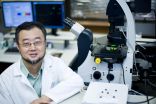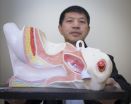(Press-News.org) CAMBRIDGE, MA -- The "friendly" bacteria inside our digestive systems are being given an upgrade, which may one day allow them to be programmed to detect and ultimately treat diseases such as colon cancer and immune disorders.
In a paper published today in the journal Cell Systems, researchers at MIT unveil a series of sensors, memory switches, and circuits that can be encoded in the common human gut bacterium Bacteroides thetaiotaomicron.
These basic computing elements will allow the bacteria to sense, memorize, and respond to signals in the gut, with future applications that might include the early detection and treatment of inflammatory bowel disease or colon cancer.
Researchers have previously built genetic circuits inside model organisms such as E. coli. However, such strains are only found at low levels within the human gut, according to Timothy Lu, an associate professor of biological engineering and of electrical engineering and computer science, who led the research alongside Christopher Voigt, a professor of biological engineering at MIT.
"We wanted to work with strains like B. thetaiotaomicron that are present in many people in abundant levels, and can stably colonize the gut for long periods of time," Lu says.
The team developed a series of genetic parts that can be used to precisely program gene expression within the bacteria. "Using these parts, we built four sensors that can be encoded in the bacterium's DNA that respond to a signal to switch genes on and off inside B. thetaiotaomicron," Voigt says.
These can be food additives, including sugars, which allow the bacteria to be controlled by the food that is eaten by the host, Voigt adds.
Bacterial "memory"
To sense and report on pathologies in the gut, including signs of bleeding or inflammation, the bacteria will need to remember this information and report it externally. To enable them to do this, the researchers equipped B. thetaiotaomicron with a form of genetic memory. They used a class of proteins known as recombinases, which can record information into bacterial DNA by recognizing specific DNA addresses and inverting their direction.
The researchers also implemented a technology known as CRISPR interference, which can be used to control which genes are turned on or off in the bacterium. The researchers used it to modulate the ability of B. thetaiotaomicron to consume a specific nutrient and to resist being killed by an antimicrobial molecule.
The researchers demonstrated that their set of genetic tools and switches functioned within B. thetaiotaomicron colonizing the gut of mice. When the mice were fed food containing the right ingredients, they showed that the bacteria could remember what the mice ate.
Expanded toolkit
The researchers now plan to expand the application of their tools to different species of Bacteroides. That is because the microbial makeup of the gut varies from person to person, meaning that a particular species might be the dominant bacteria in one patient, but not in others.
"We aim to expand our genetic toolkit to a wide range of bacteria that are important commensal organisms in the human gut," Lu says.
The concept of using microbes to sense and respond to signs of disease could also be used elsewhere in the body, he adds.
In addition, more advanced genetic computing circuits could be built upon this genetic toolkit in Bacteroides to enhance their performance as noninvasive diagnostics and therapeutics.
"For example, we want to have high sensitivity and specificity when diagnosing disease with engineered bacteria," Lu says. "To achieve this, we could engineer bacteria to detect multiple biomarkers, and only trigger a response when they are all present."
INFORMATION:
While human activities have caused extinctions across the globe, your favourite beach or diving site may actually be home to as many, or more, species then it was a few decades ago.
That's the conclusion of a synthesis of 50 years of marine biodiversity data conducted by University of British Columbia (UBC) researchers.
But there is a catch. Like other studies of its kind, the synthesis relies on species population time series from sites that haven't been subject to intense human development.
"Much as you'd expect, our study shows human impacts like pollution and ...
A study to examine recessively inherited genome-wide DNA sequences has for the first time discovered a potential link with Britain's biggest killer - Coronary Artery Disease (CAD).
The research led by a team from the University of Leicester was the first time that recessively inherited DNA sequences in the whole genome called Runs of homozygosity (ROHs) were examined for a connection to the disease.
The study appears in the American Journal of Human Genetics.
CAD is a terminal clinical manifestation of cardiovascular disease and is the leading cause of death worldwide ...
Danish researchers are the first in the world to have used our genes to investigate the impact of coffee on the body. The new study shows that coffee neither increases nor decreases the risk of lifestyle diseases.
We love coffee - and we drink a lot of it. New research from the University of Copenhagen and Herlev and Gentofte Hospital shows that coffee neither increases nor decreases the risk of developing lifestyle diseases such as obesity and diabetes. The researchers have based their study on genes, as our genes play a role in how much coffee we drink in the course ...
DENVER (July 9, 2015) - A new study from the University of Colorado Denver finds that male exotic dancers, or strippers, remain committed to stripping because it enhances their self-concept.
The study by Maren Scull, an instructor of Sociology in the CU Denver College of Liberal Arts and Sciences, was published online this month in Deviant Behavior, the only scientific journal that specifically addresses behaviors that violate social norms. Scull's research focuses on how exotic dancing influences the way male strippers view themselves.
"Because stripping is a stigmatizing ...
This news release is available in French.
Since the treatment has become available, HIV is often described as "undetectable" and the risk of transmission has been drastically reduced. However, the epidemic is still quite present in the lives of many gay and bisexual men... and in public spaces. This often overlooked dimension of the disease has been brought to light by Gabriel Girard of the University of Montreal's Public Health Research Institute (IRSPUM) - HIV is still alive in the city, especially in the Village, Montreal's gay district. "Urban traces are significant ...
WEST LAFAYETTE, Ind. -- A key set of immune cells that protect the body from infection would be lost without directions provided by vitamin A, according to a recent study.
A team of researchers from Purdue University found retinoic acid, a metabolite that comes from digested vitamin A, is necessary for two of the three types of innate immune cells that reside in the intestine to find their proper place.
"It is known that vitamin A deficiencies lead to increased susceptibility to disease and low concentrations of immune cells in the mucosal barrier that lines the intestines," ...
MADISON, Wis. -- A study authored by two University of Wisconsin-Madison graduate students indicates that while playing video games can improve mood, violent games may increase aggressive outcomes.
The study, authored by James Alex Bonus and Alanna Peebles, graduate students in Communication Arts, and Karyn Riddle, assistant professor in the School of Journalism and Mass Communication, was published in June in the journal Computers in Human Behavior. The researchers looked at how video games may be used to manage emotions -- specifically, whether playing the games can ...
(Edmonton) Screening newborn babies who are in the neonatal intensive care unit (NICU) using a testing process called high-frequency tympanometry can help identify middle-ear problems earlier, according to newly published research from a local team of researchers.
"If people cannot hear, we need to know if the problem is with the middle ear, inner ear or hearing nerve. Obviously, a baby cannot tell you, so in the clinic it's hard to know when they have hearing loss," explained Ming Zhang, an associate professor at the U of A's Department of Communication Sciences and ...
The relationship between mental and physical health is well established. But when mental and physical illnesses co-occur, patients' accounts of physical illness are sometimes arbitrarily discredited or dismissed by physicians.
Research by Jeremy D. Coplan, MD, professor of psychiatry at SUNY Downstate Medical Center, and colleagues has documented a high rate of association between panic disorder and four domains of physical illness. The research could alter how physicians and psychiatrists view the boundaries within and between psychiatric and medical disorders.
"Patients ...
Green buildings are indeed healthy buildings. So says Dr. Joseph Allen and fellow researchers of the Harvard T.H. Chan School of Public Health in the US. They conducted the first comprehensive review of studies that focused on green buildings and summarized the health benefits for the people who work and live in them. The review is published in Springer's journal Current Environmental Health Reports.
The green building movement has taken off in the past 10 years. According to Leadership in Energy and Environmental Design (LEED®), which certifies green building standards, ...



